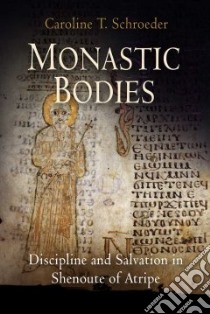Monastic Bodies - 9780812239904
Un libro in lingua di Schroeder Caroline T. edito da Univ of Pennsylvania Pr, 2007
- € 74.80
- Il prezzo è variabile in funzione del cambio della valuta d’origine
Shenoute of Atripe led the White Monastery, a community of several thousand male and female Coptic monks in Upper Egypt, between approximately 395 and 465 C.E. Shenoute's letters, sermons, and treatises—one of the most detailed bodies of writing to survive from any early monastery—provide an unparalleled resource for the study of early Christian monasticism and asceticism.
In Monastic Bodies, Caroline Schroeder offers an in-depth examination of the asceticism practiced at the White Monastery using diverse sources, including monastic rules, theological treatises, sermons, and material culture. Schroeder details Shenoute's arduous disciplinary code and philosophical structure, including the belief that individual sin corrupted not only the individual body but the entire "corporate body" of the community. Thus the purity of the community ultimately depended upon the integrity of each individual monk.
Shenoute's ascetic discourse focused on purity of the body, but he categorized as impure not only activities such as sex but any disobedience and other more general transgressions. Shenoute emphasized the important practices of discipline, or askesis, in achieving this purity. Contextualizing Shenoute within the wider debates about asceticism, sexuality, and heresy that characterized late antiquity, Schroeder compares his views on bodily discipline, monastic punishments, the resurrection of the body, the incarnation of Christ, and monastic authority with those of figures such as Cyril of Alexandria, Paulinus of Nola, and Pachomius.
Informazioni bibliografiche
- Titolo del Libro in lingua: Monastic Bodies
- Sottotitolo: Discipline and Salvation in Shenoute of Atripe
- Lingua: English
- Autore: Schroeder Caroline T.
- Editore: Univ of Pennsylvania Pr
- Collana: Univ of Pennsylvania Pr (Hardcover)
- Data di Pubblicazione: 06 Marzo '07
- Genere: RELIGION
- Argomenti : Monasticism and religious orders Egypt History Monasticism and religious orders History Early church, ca. 30-600
- Pagine: 237
- Dimensioni mm: 234 x 158 x 25
- ISBN-10: 0812239903
- EAN-13: 9780812239904


